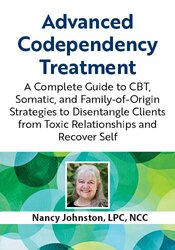

Trapped in patterns of fixing, pleasing, or managing everyone around them, codependent clients come to your office, anxious, depressed and in seriously unhealthy relationships.
But sessions are tough as they continually steer the conversation back to someone else – the fear of looking inward pushing them to retreat into the familiar territory of putting others first and themselves last.
If you’re not careful you can end up joining them in trying to solve the problems of others, missing chances for self-discovery and healing.
That’s why recognized codependency expert and author, Nancy Johnston, LPC, created this training – to give you the tools to help your clients develop a deeper understanding of themselves, establish healthier boundaries, and foster more authentic and fulfilling connections with others!
You’ll get:
This is the step-by-step guide for taking clients from codependency to self-recovery. Packed with assessment tools, specific interventions, skill building exercises, case studies and more, there has never been a better chance to get tangible, life-changing results for your clients.
PLUS, you get The Clinician’s Codependency Treatment Workbook FREE when you register!
Purchase today!
Planning Committee Disclosure - No relevant relationships
All members of the С�����Ƶ. planning committee have provided disclosures of financial relationships with ineligible organizations and any relevant non-financial relationships prior to planning content for this activity. None of the committee members had relevant financial relationships with ineligible companies or other potentially biasing relationships to disclose to learners. For speaker disclosures, please see the faculty biography.
Continuing education credit information is coming soon for this non-interactive self-study package.
CE hours may be available for select professions, as listed in the target audience. Hours will be dependent on the actual recording time. Please check with your state licensing board or organization for specific requirements.
There may be an additional fee for CE certificates. Please contact our Customer Service at 1-800-844-8260 for more details.
**Materials that are included in this course may include interventions and modalities that are beyond the authorized practice of your profession. As a licensed professional, you are responsible for reviewing the scope of practice, including activities that are defined in law as beyond the boundaries of practice in accordance with and in compliance with your professions standards.

Nancy L. Johnston, MS, LPC, LSATP, MAC, NCC, is a licensed professional counselor and licensed substance abuse treatment practitioner in private practice in Lexington, VA, US. With 48 years of clinical experience, Nancy is a Master Addiction Counselor and an American Mental Health Counselors Association (AMCHA) Diplomate in substance abuse & co-occurring disorders.
She has authored three books on codependency - two published by Central Recovery Press: Disentangle: When You’ve Lost Your Self in Someone Else 2nd Edition (2020) and My Life as a Border Collie: Freedom from Codependency (2012) and the third published by С�����Ƶ Publishing: The Clinician’s Codependency Treatment Workbook (2024).
Nancy has two digital seminars produced with С�����Ƶ for clinicians on treating codependency: “Codependence: Treatment Strategies for Clients Who Lose Themselves in Others” (2020) and “The Codependency Treatment Guide: CBT, Somatic Strategies and More to Disentangle Clients from Dysfunctional Relationships and Recover Self” (2022).
Nancy offers online self-recovery workshops and delights in designing and facilitating Codependence Camp twice/year in person at a retreat site in VA. Codependence Camp has been in operation since 2004.
Over the past 25 years Nancy has presented at numerous conferences including the Cape Cod Symposium on Addictive Disorders, the Carolinas Conference for Addiction and Recovery, Addiction: Focus on Women, the Virginia Summer Institute for Addiction Studies, the American Mental Health Counselors Association’s Annual Conference, the Virginia Counselors Association’s Annual Conference, Specialty Docket Training for the Virginia Supreme Court, and the Psychotherapy Networker Symposium 2025.
More information about Nancy and her work is available at her website:
Speaker Disclosures:
Financial: Nancy Johnston maintains a private practice and is an independent contractor with Dr. Kuley and Associates. She receives royalties as a published author. Nancy Johnston receives a speaking honorarium from Virginia Summer Institute for Addiction Studies. She receives a speaking honorarium and recording royalties from Psychotherapy Networker and С�����Ƶ. She has no relevant financial relationships with ineligible organizations.
Non-financial: Nancy Johnston is a member of the American Mental Health Counselors' Association, the Virginia Counselors' Association, the National Association of Alcohol and Drug Abuse Counselors, and the Virginia Association of Addiction Professionals.
Visit our FAQ page at www.pesi.com/faq or contact us at www.pesi.com/info
Access never expires for this product.
Intake and Assessment of Clients with Codependent Behaviors
Establish a Therapeutic Relationship with a Codependent Client
Psychoeducation and Early Sessions
Family of Origin and Parts Work to Help Clients Understand their Codependent Characteristics
Somatic and Cognitive Techniques to Enhance Codependent Clients’ Awareness of Body, Mind, Emotions, and Spirit
Skills to Transform Shame, Manage Guilt, Be Assertive, and Set Healthy Boundaries
Exercises and Practices That Help Clients Learn How to Count on Self
Make Self-Recovery a Way of Being
Clinical Applications
Satisfaction Guarantee
Your satisfaction is our goal and our guarantee. Concerns should be addressed to: PO Box 1000, Eau Claire, WI 54702-1000 or call 1-800-844-8260.
ADA Needs
We would be happy to accommodate your ADA needs; please call our Customer Service Department for more information at 1-800-844-8260.
С�����Ƶ Mobile App
Access CE trainings on your phone or tablet through our free mobile app. Choose video or audio-only versions of online courses from the world’s best instructors, and complete your CE requirements anywhere, anytime, at your own pace.
Please wait ...